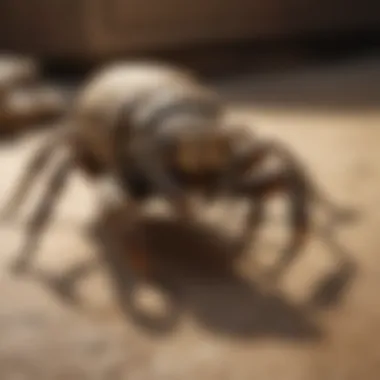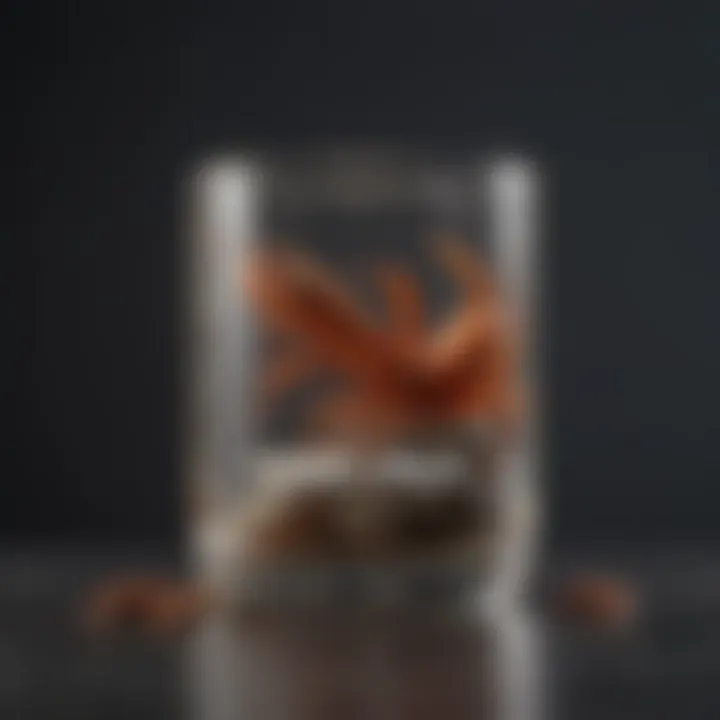Cost Considerations for Sealing Your Home Against Scorpions


Intro
Sealing your home against scorpions is not just a matter of comfort; it is a necessary step for those living in areas where these pests thrive. The expenses incurred in this process can vary significantly based on several factors. This article aims to dissect those costs, providing homeowners with the essential information they need to weigh their options effectively. Understanding the financial implications of sealing one's house is critical for smart planning and resource allocation.
Understanding the Pest
Identification
To tackle any pest problem, one must begin with understanding what they are dealing with. Scorpions exhibit distinctive features. They have eight legs, pincers, and stingers. Common species in the United States include the Arizona bark scorpion and the striped bark scorpion. Knowing which species you face can greatly influence the sealing strategy you choose, as some are more aggressive than others.
Life Cycle
The life cycle of scorpions consists of three main stages: egg, juvenile, and adult. Female scorpions can give birth to 25 to 35 young at once. These juveniles are especially vulnerable. Understanding this cycle can provide insight into the best times for sealing efforts. For example, sealing should be prioritized during the breeding season when young scorpions are emerging.
Pest Prevention Strategies
Environment Modification
Scorpions often thrive in environments that offer shelter, such as cracks in walls and debris around the yard. Homeowners can reduce the likelihood of an infestation by modifying the exterior landscape. The following steps are useful:
- Remove debris: Clear away debris, rocks, and wood piles near the foundation.
- Trim vegetation: Keep plants and bushes well-trimmed to eliminate hiding spots.
- Fix leaks: Water sources can attract scorpions. Ensure all leaks are repaired.
Physical Barriers
Physical barriers can significantly minimize scorpion entry. This can include:
- Sealing cracks: Use silicone or caulk to seal cracks and gaps in walls, windows, and doors.
- Install door sweeps: Ensure that all exterior doors have tight-fitting sweeps.
- Consider a barrier treatment: Apply a gravel barrier around the perimeter of the home.
Control Methods
Chemical Control
For immediate relief from scorpions, chemical treatments can be effective. Products like pesticides can be useful, but they should be applied carefully to avoid risks to pets and children. Always follow the manufacturer’s instructions to ensure effectiveness and safety.
Biological Control
Biological control methods involve using natural predators to manage pest populations. The use of certain insect-eating animals, such as geckos and certain birds, may help manage the scorpion population. This is a more environmentally friendly approach but may require careful planning.
By understanding the costs related to both prevention and control, homeowners can devise a comprehensive strategy to seal their homes against potential scorpion threats.
Overall, effective sealing involves various steps and considerations. When homeowners can assess the financial implications and benefits, they make informed decisions that enhance their living spaces. Whether through physical measures or the application of chemicals, a thorough understanding of scorpions and appropriate preventive tactics can lead to a more secure and peaceful home environment.
The Importance of Sealing Against Scorpions
Sealing a home against scorpions is not merely a precaution, but a vital measure for maintaining safety and comfort in scorpion-prone regions. The presence of scorpions can evoke considerable concern among homeowners. While many may perceive these creatures as merely an annoyance, they carry significant risks. Their venom, although rarely lethal to humans, can cause painful reactions, particularly in children and pets. Thus, understanding the significance of sealing against these pests is essential.
Understanding Scorpion Behavior
Scorpions, as predatory arachnids, often seek shelter in warm, dry areas. They are nocturnal and tend to be active during the night when they hunt for insects. Their tendencies to hide in dark crevices make homes attractive targets. Holes in walls, gaps around windows, and poorly sealed doors can provide easy access. Recognizing this behavior is crucial. The more one understands how scorpions enter homes, the better equipped they become to prevent invasions. Their ability to travel undetected under fences and through small openings illustrates the importance of addressing vulnerabilities in and around the house.
Why Sealing is Necessary
Sealing is necessary not just for prevention, but for overall peace of mind. A well-sealed home acts as a fortress against unwanted intruders. It significantly reduces the risk of scorpion pathways into living spaces. By using effective materials to create barriers, homeowners can deter scorpion infestations. The effectiveness of sealing extends beyond simply blocking entry; it can help regulate the indoor environment as well. For example, proper sealing prevents draughts, contributing to energy efficiency and ultimately lowering utility costs.
Sealing comes with other ancillary benefits, such as the potential reduction of allergens and pests other than scorpions. It creates a healthier living environment free from various irritants.
Factors Influencing Sealing Costs
Understanding the factors that influence the costs of sealing your home against scorpions is vital for homeowners. Each element of the sealing process can affect the overall financial commitment required. By breaking down these factors, you can make informed decisions that align with your budget and needs.
Identifying the right material, understanding labor implications, and assessing your home’s features are essential steps. This will help you balance cost and efficacy. Ultimately, knowing these factors can aid in proper planning and implementation of scorpion prevention measures.
Material Type and Quality
The type and quality of materials you choose for sealing your home have a direct impact on the costs. Different materials come with varying price tags and durability. For example, high-quality silicone sealants are often more expensive than basic caulk. However, they may provide better protection against scorpions. Investing in superior materials can lead to longer-lasting results, reducing the need for frequent replacements.


Here are some common material options:
- Silicone Sealants: Flexible and resistant to water, silicone is a popular choice for sealing cracks and gaps.
- Weatherstripping: Used around doors and windows, this material prevents gaps where scorpions may enter.
- Spray Foam Insulation: This expands in place, filling larger gaps but can be pricier than other options.
- Mesh Screens: Cost-effective for windows and vents, they also provide a barrier without sealing entirely.
Considering the long-term benefits versus initial costs is crucial when selecting materials. While cheaper options may save money upfront, they might not provide the desired protection.
Labor Costs and Installation
Labor costs can significantly affect the total expenses when sealing your home. Professional installation ensures the job is done correctly, but hiring skilled labor can add to your budget. If you are considering DIY options to save money, you need to evaluate your skills and time constraints. Incorrect installation can result in ineffective sealing, negating any saved costs.
When hiring professionals, consider:
- Hourly Rates: Understand the local market rates for labor and availability.
- Project Scope: The complexity of the sealing process can alter costs. Large areas or unique home designs may require more time and specialized skills.
- Experience of Contractors: More experienced professionals may charge higher rates but often provide better results.
Investing in proper installation is essential for both the effectiveness of the sealing and your peace of mind.
House Size and Complexity
The size and complexity of your home also play a significant role in determining sealing costs. Larger homes generally require more materials and labor, thus increasing expenses. This can include various aspects such as rooflines, foundations, and even landscaping.
Consider these points:
- Square Footage: More sq ft means more materials and labor time, clearly raising the overall budget.
- Architectural Features: Homes with complex designs may have more areas to seal, increasing the scope of work.
- Accessibility: If certain areas of your home are challenging to reach, this can add time and difficulty to the project.
Overall, the unique physical structure of your home should be carefully considered. It will aid in providing a clear picture of the expected costs and help set realistic budgets.
Common Sealing Materials
When sealing your home against scorpions, choosing the right materials is not just a matter of preference; it is a crucial decision that impacts effectiveness and long-term durability. Each material has its unique properties, cost implications, and performance characteristics. Understanding these factors allows homeowners to make informed choices that protect their living spaces optimally. Here, we will explore four common sealing materials: silicone sealants, weatherstripping, spray foam insulation, and mesh screens. Each of these plays a significant role in preventing scorpions from entering the home while ensuring energy efficiency.
Silicone Sealants
Silicone sealants are a popular choice due to their flexibility and durability. They adhere well to multiple surfaces, such as wood, glass, and metal, creating a tight seal that is difficult for scorpions to penetrate. A key benefit of silicone is its water resistance, which contributes to the longevity of the seal. When applied correctly, silicone sealants can last for many years without needing replacement. However, it is essential to inspect the seal periodically for any signs of degradation.
In terms of cost, silicone sealants are generally affordable and can be purchased in tubes for easy application. The application method often requires minimal tools, making it suitable for DIY projects. Here are some things to consider:
- Adhesion: Check that the sealant is compatible with your surfaces.
- Weather Resistance: Choose a product specifically rated for exterior use if sealing outside.
- Curing Time: Allow adequate curing time before exposing the sealant to moisture.
Weatherstripping
Weatherstripping is another effective material for sealing gaps around doors and windows, areas where scorpions might enter. It comes in various forms, including adhesive-backed foam, V-strip, and door sweeps. The primary goal of weatherstripping is to reduce air leakage, improving energy efficiency while also blocking unwanted pests.
The installation process is relatively straightforward, which makes it appealing for many homeowners. While the upfront cost can vary depending on the chosen type, weatherstripping is generally cost-effective and can lead to savings on heating and cooling bills over time.
When selecting weatherstripping, keep these points in mind:
- Type: Choose a type suitable for the specific area being sealed.
- Durability: Consider how long you expect it to last, as some materials may wear out faster than others.
- Ease of Application: Some materials require more intricate installation techniques, while others may be as simple as peeling and sticking.
Spray Foam Insulation
Spray foam insulation serves dual purposes. It provides excellent thermal insulation and creates a robust barrier against scorpions. When applied, the foam expands, filling gaps and cracks that other sealing methods may miss. This characteristic is particularly valuable in older homes, where settling may have created numerous entry points.
While the initial investment for spray foam can be higher than other sealing materials, its energy savings and pest deterrent qualities can offer long-term financial benefits. The foam is available in both professional-grade products and DIY kits. Property owners should carefully consider the application method, ensuring they follow the instructions for use properly to achieve optimal results.
Key considerations for using spray foam insulation include:
- Expansion Rate: Different foam products expand at different rates; select one that matches your needs.
- Unique Properties: Some foams contain insect-repelling agents, adding an extra layer of protection.
- Application Expertise: If unsure, hiring a professional for installation may yield the best results.
Mesh Screens
Mesh screens are a simple yet effective physical barrier, often used to cover vents and openings. They prevent scorpions from entering through gaps while allowing for air flow and natural ventilation in your home. Unlike other materials, mesh screens require minimal maintenance once properly installed. They also significantly reduce the need for chemical pest control methods.
The cost of mesh screens can vary based on size and type. More durable materials usually come at a higher price but can offer enhanced protection. When selecting mesh screens, consider the following aspects:
- Mesh Size: Ensure the size is small enough to keep scorpions out.
- Material Strength: Choose durable materials that can withstand environmental conditions.
- Installation: Determine whether you will need to hire someone or if it can be a DIY task.


Choosing the right sealing material is an investment in your home’s security and comfort. By evaluating these common sealing materials, homeowners can protect their property and enhance their living space against scorpions effectively.
Cost Estimation for Sealing
When considering how to seal your home against scorpions, understanding the associated costs is essential. Homeowners need to create a budget that effectively covers materials and labor. There are various factors that can influence this cost. Knowing these can empower homeowners to make informed decisions. Furthermore, accurate cost estimation can help prevent overspending.
Average Material Costs
Material choices significantly impact the overall sealing cost. Different materials offer varying levels of effectiveness and price points. Commonly used sealing materials include silicone sealants, weatherstripping, spray foam insulation, and mesh screens.
- Silicone sealants typically range from $5 to $15 per tube. They provide a flexible barrier, ideal for cracks and gaps.
- Weatherstripping costs about $10 to $30 per roll, depending on the quality and length. It is essential for sealing doors and windows.
- Spray foam insulation is generally priced between $15 to $25 per can. This option expands to fill gaps and is useful in larger sealing projects.
- Mesh screens, often used for ventilation areas, can range from $20 to $40 depending on the type and size needed.
Overall, the choice of materials can reflect in both the effectiveness and cost.
Labor Cost Breakdown
Labor costs must also be factored into the budget. These costs can vary based on the local market and the complexity of the sealing project. Generally, homeowners should expect to pay between $50 to $100 per hour for professional installation.
Factors affecting labor costs include:
- Experience of the contractor: More seasoned professionals may charge higher rates.
- Location: Prices can differ based on geographical regions.
- Time required for the job: Larger homes or more extensive sealing may lead to increased labor hours.
Getting quotes from multiple contractors can help homeowners find a reasonable rate.
Total Cost Range
Calculating the total cost for sealing a home involves both material and labor expenses. A small project might cost around $300 to $600, while larger projects can exceed $1,500. Home size and the extent of sealing required directly influence these figures.
To summarize:
- Small homes: estimated costs range from $300 to $600.
- Medium-sized homes: expect around $600 to $1,200.
- Large homes or complex sealing needs: costs can go above $1,500.
Investing in proper sealing against scorpions can prevent potential infestations in the future. While upfront costs may seem high, they often lead to longer-term savings and enhanced peace of mind.
Cost Versus Benefits
When considering sealing your home against scorpions, understanding the cost versus the benefits is crucial. Homeowners must evaluate if the financial investment in sealing methods will pay off in terms of protection and long-term savings. It isn't just about spending money; it is about how effectively those expenditures translate into making your home safer and more secure from scorpion intrusions.
Prevention of Scorpion Infestation
Sealing your home serves as a primary barrier against potential scorpion infestations. These pests often invade homes looking for food or shelter. By applying proper sealing techniques—such as caulking gaps and installing screens—you minimize the entry points for these creatures. A well-sealed home significantly decreases the likelihood of scorpions getting inside.
A home treated with effective sealing measures has a much lower chance of experiencing an infestation.
Investing in sealing your home proactively can save you from the distress and potential costs associated with dealing with an infestation. Scorpions can reproduce quickly, leading to a minor problem escalating into a full-blown invasion.
Long-term Financial Savings
While the initial costs of sealing may seem high, they can lead to long-term financial benefits. Homeowners should consider costs associated with scorpion control methods after an infestation strikes. Pest control services can quickly add up, not to mention potential damage to your property from a scorpion infestation.
By sealing your home, you reduce the need for costly extermination services. You also keep your home’s value intact. Preventing infestations through sealing can help avoid expensive repairs from damage that pests may cause. Furthermore, insurance premiums may be more favorable if you can demonstrate proactive measures against pest intrusions.
Safety and Peace of Mind
One of the most compelling benefits of sealing against scorpions is the safety and peace of mind it provides. Scorpions are not only a nuisance but can also pose health risks due to their venom. The anxiety of living in a home where scorpions can easily enter is reduced when you take sealing measures seriously.
Homeowners can sleep better knowing that their living space is adequately protected. This emotional well-being is often underestimated, yet is a significant factor motivating many to invest in sealing solutions. Knowing you have taken steps to secure your home fosters a sense of security that is invaluable in today’s environment.
Alternative Methods for Scorpion Control
Exploring alternative methods for controlling scorpions broadens the options available to homeowners. While sealing the home is a crucial step in prevention, various methods can complement this strategy, especially in areas where scorpion populations are problematic. Understanding these methods can empower homeowners to protect their living spaces more effectively.
Chemical Treatments
Chemical treatments offer a direct approach to controlling scorpion presence. These involve the application of pesticides specifically designed to target scorpions. Various formulations exist, such as residual sprays and granules, which can be applied around the home’s perimeter. It is important to consider the following factors when using chemical treatments:


- Efficacy: Not all chemicals have the same effectiveness against scorpions. It is essential to select products that mention scorpions explicitly.
- Safety: Homeowners must evaluate the safety of chemical use, especially if children or pets are present. Always follow instructions to minimize risk.
- Environmental impact: Consider using eco-friendly products when possible. These options are less harsh on the environment and can still be effective.
Using chemical treatments can provide immediate results. However, they are not a long-term solution. Regular reapplication may be necessary, which can lead to additional costs over time.
Natural Predators
Introducing natural predators is an eco-friendly method to control scorpion populations. Some species, such as certain types of spiders and birds, naturally prey on scorpions. By creating an habitat that attracts these predators, homeowners can help maintain a balance in the ecosystem around their property. Key points to consider include:
- Biodiversity: Encouraging a diverse ecosystem can deter scorpions and other pests naturally.
- Sustainability: Utilizing natural predators minimizes reliance on chemicals, appealing to environmentally conscious homeowners.
- Habitat considerations: Planting specific flora can attract beneficial predators. For example, certain flowering plants can attract insects that are food sources for the predatory species.
This method requires patience as it may take time for natural predators to establish themselves and affect scorpion populations.
Environmental Modifications
Making environmental modifications to the home and surrounding area can significantly reduce scorpion habitats. Simple changes can make homes less appealing to scorpions. Consider these actions:
- Eliminating clutter: Remove debris, piles of wood, and stones that can provide shelter for scorpions.
- Proper landscaping: Keep shrubs trimmed and grass well-manicured. This reduces hiding places for scorpions.
- Lighting choices: Scorpions are attracted to light. Using yellow porch lights or LED lights can minimize their attraction to the property.
These modifications not only diminish scorpion habitats but also enhance the overall appearance and safety of the outdoor area.
Alternative methods for scorpion control provide useful complements to sealing your home. Homeowners can create a multifaceted approach to prevention.
Implementing a combination of chemical treatments, utilizing natural predators, and making environmental modifications can create an effective defense against scorpions. Each method has its considerations, but collectively they can offer a comprehensive strategy for maintaining a scorpion-free living environment.
Homeowner Considerations
Homeowner considerations play a crucial role in the decision-making process regarding sealing your home against scorpions. Understanding the vulnerabilities of your home can help you tailor specific solutions to create a safer living environment. This knowledge not only empowers homeowners but also helps in effective planning and resource allocation.
Assessing Your Home's Vulnerability
To assess your home's vulnerability, start by identifying entry points where scorpions may gain access. These can include gaps in doors, windows, and cracks in foundations. Thoroughly inspect your home's perimeter and interior for any signs of potential scorpion ingress. Look for tiny spaces that an average human eye might miss.
Additionally, consider the landscaping around your property. Dense vegetation, rocks, and debris can serve as hiding places for scorpions. A well-maintained yard with fewer hiding spots may reduce the chances of scorpion presence.
Understanding the specific type of scorpion prevalent in your area is also important. Knowing their habits and behaviors will help you evaluate risks accurately. Some scorpions are more likely to stay indoors for temperature regulation, thus increasing the importance of sealing gaps in the home.
Choosing the Right Professional Help
Selecting a seasoned professional for sealing work is critical. Not all service providers have the same level of expertise in dealing with scorpions. It is advisable to seek contractors who specialize in pest control and home sealing. They will have the necessary knowledge about materials used specifically for scorpion deterrence.
When interviewing potential professionals, inquire about their experience with similar projects. Ask for references and check online reviews to assess their reliability and effectiveness. It's essential to ensure that the contracted service meets safety standards and uses eco-friendly sealing materials when possible. This meticulous approach will enhance the effectiveness of sealing and provide peace of mind.
DIY Sealing Pros and Cons
While hiring professionals can provide excellent results, some homeowners may consider the DIY route for sealing against scorpions. This approach has its own advantages and disadvantages.
Pros of DIY Sealing:
- Cost-effective: You can save labor costs by taking on the sealing work yourself.
- Flexible Scheduling: DIY allows you to work at your own pace and convenience.
- Personal Satisfaction: Completing a project on your own can be gratifying and empower you as a homeowner.
Cons of DIY Sealing:
- Lack of Expertise: Without proper knowledge, the sealing may not be as effective.
- Time-consuming: Sealing work requires a substantial investment of time and effort.
- Potential Waste of Materials: Miscalculations in materials can result in increased costs.
Ultimately, the decision to go DIY or hire professionals should depend on your comfort level with home improvement tasks and your understanding of scorpion behavior and sealing techniques.
Final Thoughts on Cost and Efficacy
In the realm of home maintenance, sealing against scorpions is an important consideration. Understanding the cost versus the efficacy of such sealing measures can lead to informed decision-making among homeowners. As scorpions tend to thrive in suitable environments, taking preventive actions becomes a fundamental aspect of ensuring a safe living space. Here we explore the significant elements that lead to smarter choices for homeowners.
Making an Informed Decision
Homeowners must assess the financial implications carefully before sealing their homes. This involves evaluating the material costs, labor expenses, and potential long-term savings that effective sealing might provide. For instance, investing in high-quality sealants may result in fewer invasions and less expenditure on pest control in the future. Moreover, understanding the right professionals to hire can prevent costly mistakes during installation.
Consider creating a cost-benefit analysis to weigh the initial sealing expenses against long-term benefits. An analysis can clarify which materials and methods offer the most protection at less cost.
Evaluating Long-term Solutions
Assessing the lasting impact of sealing options is essential. Not every sealing method provides the same duration of effectiveness. For example, silicone sealants and spray foam insulation can deliver varying longevity in different climates. Checking references and research can reveal which solutions have successfully protected houses from scorpions in the past.
Additionally, homeowners should consider integrating preventive maintenance practices once sealing is complete. Routine inspections can ensure that the sealing remains effective and that any potential weaknesses are promptly addressed. This ongoing diligence contributes not only to maintaining a scorpion-free home but also to enhancing overall property value.
"Effective sealing is not just an upfront expense; it is an investment in home safety and future savings."







